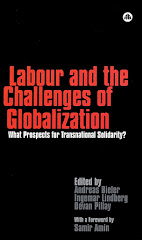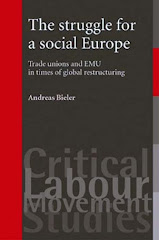 |
| Photo by UggBoy - Ugg Girl |
On the causes of the crisis
Unlike
literature that tends to focus on diverse national institutional configurations
as distinctive, separate entities, post-Keynesian scholars emphasise unevenness
across the European political economy, tending to identify the institutional
set-up of EMU as the main cause of the crisis. With exchange rates fixed
between countries as a result of the common currency and national fiscal policy
severely restricted within the Stability and Growth Pact, the only way to
increase competitiveness has been downward pressure on wages and work-related
conditions. Thus, EMU was by default designed from the beginning as a model
which would struggle to generate enough demand and almost inevitably relied on
financialisation and the creation of national and personal debt for economic
growth. This resulted in the formation of debt-driven and export-driven
economic growth models. Both of these allow for growth but are also
intrinsically unstable because they require increasing debt to income ratios,
domestic debt in the former, foreign debt from trading partners in the latter.
Hence, the main problems of EMU are understood by some post-Keynesians to be
the result of insufficient demand and, in particular, the asymmetries in the
formation of aggregate demand across the European political economy shaped by
the institutions of EMU.
Ultimately,
post-Keynesians contend that the creation of credit links back to increasing
income inequality over past decades. Seeing their relative income decline,
poorer households increasingly had to rely on credit to maintain living
standards. The introduction of the euro and the related low interest rates in
peripheral countries facilitated this financialisation of Europe’s political
economy, as it made cheap credit more available. Peripheral states, unable to
compete with the productivity levels and strong export performance of the likes
of Germany, ended up with large current account deficits. In the long run, such
development strategies based on capital inflows were unsustainable.
The
primary limitation of such analysis is that it implies capitalism can overcome
crises successfully, if the right state policies are adopted. In response to
crisis, we argue that capital is in constant search for new markets in a drive
towards outward expansion along uneven and combined developmental lines.
Therefore, whilst post-Keynesians correctly identify how the development
trajectories of national political economies are further drawn together in
relations linked to institutional architecture of the single currency, they
overlook that this has simply reinforced and exacerbated forms of unevenness
that have characterised the European political economy for much longer. Free
trade policies, as initially embedded within the EU Customs Union since 1968
and then especially the Internal Market from the mid-1980s onwards, when free
trade was extended from trade in goods to trade in services and finance, have
generally tended to reproduce long-standing asymmetries of uneven development
and polarising conditions between countries.
We
demonstrate this dynamic in the paper through a focus on the development of
Greece and Portugal, analysing how less developed countries remain locked into
low-value added industrial sectors or even experience deindustrialisation as
industries in countries with lower productivity levels cannot compete with the
higher productivity levels in partner countries, which benefit
disproportionately from trade. In short, rather than simply focusing on the
institutional set-up of EMU our argument is that uneven development pertains to
the very expansionary essence of capital and the existence of competition
between ‘many capitals’ searching for surplus profit and increases in the rate
of surplus-value. Drawing on Neil Smith, Nicos Poulantzas and Ernest Mandel, we
therefore share the view that uneven and combined development is a historically
specific geographical expression of capitalism and a necessity within capital
accumulation, which is generative in shaping variations across the European
political economy.
On resolving the crisis
When
it comes to potential solutions to the crisis, wage growth is regarded as
essential for the stimulation of aggregate demand. Emphasis is placed on wages
growing in line with productivity. However, in export-oriented countries –
particularly in Germany – it is argued that wage growth needs to be above
productivity growth plus inflation in order to restore macroeconomic balance. A
prominent proposal in this respect is the ‘European wage standard’, based on
national collective bargaining that is co-ordinated at the European level and
intended to cause a convergence at the regional level of national wage shares,
and, thereby, halt falling wage-shares. The vision for the EU’s future is
clearly a federalist solution with a common economic and wage co-ordination
policy.
The
focus on the ‘right’ state policies indicates the second key problem of
post-Keynesian analyses in our regard. They are in no doubt that the main cause
of a decline in the share of wages in national income is the decline in the
bargaining power of trade unions. Therefore, to ensure wage growth, trade
unions need to be empowered and play a clear role together with strong
employers’ associations, plus government involvement if needed, in national
wage bargaining. In other words, post-Keynesians invoke national institutions
linked to the post-World War II class compromise that had seemed to guarantee
steady wage increases and strong domestic demand levels in industrial countries
such as Germany and Sweden during the 1950s, 1960s and 1970s.
Such
a technocratic vision, however, completely misunderstands the dynamics
underlying working class gains in the post-1945 European political economy.
Asbjørn Wahl makes clear that strong bargaining institutions were not the result
of benevolence by employers or state policies but rather a result of class
struggle. The outcome was an unstable equilibrium of compromises, in which
capital retained the right to own the means of production in exchange for
rising wages and an expansive welfare state. The Keynesian economic consensus
at the time also underpinned European integration with its objective of
obtaining social cohesion across the EU. However, against the background of
global restructuring and the increasing transnationalisation of production and
finance, especially from the early 1980s onwards, the Keynesian consensus was
replaced by processes of variegated neoliberalism. Capital, now organising
across transnational networks of production, renounced national class compromises
based on its superior structural power vis-à-vis trade unions. At the European
level, the emergence of a new compromise of ‘embedded neoliberalism’ occurred.
When the EU was enlarged to Central and Eastern Europe in 2004, key
redistributive policies were not fully extended to the new members.
In
short, the post-Keynesian proposal of reflating demand levels through wage
increases goes completely against the dominant trend of recent neoliberal
restructuring. As Stockhammer and Köhler admit themselves, the post-Keynesian
‘suggestions have strong normative elements with little regard for the
political preconditions of its implementation’. For example, despite the poor
socio-economic record of crisis management in Greece and Portugal, in
strengthening capital over labour, austerity is successfully facilitating new
points of value-capture assisting capital in the search for further surplus
accumulation. The pervasive privatisation programmes included in the various
Memorandums of Understanding that Greek and Portuguese governments have signed
with the Troika are clear examples of this. Thus, it is no surprise that
magnified neoliberal restructuring has continued to be the main response to the
Eurozone crisis in Europe. Putting class struggle in its rightful analytical
place, alongside broader normative concerns for a progressive exit from crisis,
addresses a significant limitation of post-Keynesian accounts of crisis
management and policy prescriptions.
And
yet, we remain keen to emphasise that our account of crisis, austerity and
restructuring does not imply that there is no resistance or that alternatives
are impossible. Counter-movements, however, cannot simply stem from theoretical
reflections by post-Keynesian economists. They emerge out of concrete struggles
often in spaces where exploitation is at its severest. Be it Vio.me, a large
metallurgy factory in the north of Greece occupied and run by its workers, be
it the social health care clinics across Greece, be it ongoing resistance
against water privatisation in cities and towns across Greece and Portugal, or
be it the fight back for housing in Spain, it is through such counter-spaces of
class struggle that, ultimately, the way towards a different future may emerge.
This article was first published on the Progress in Political Economy blog at the University of Sydney, Australia on 12 February 2019.












No comments:
Post a Comment
Comments welcome!